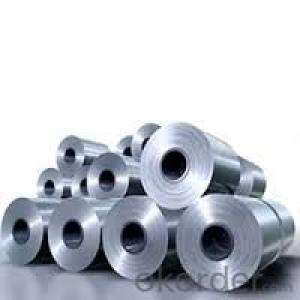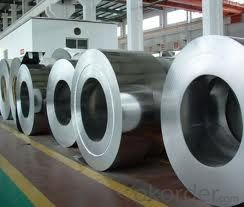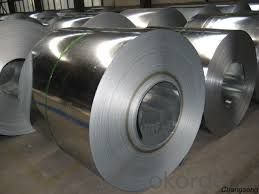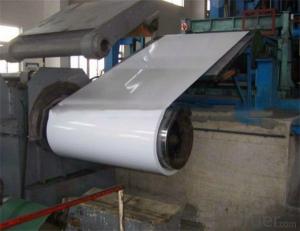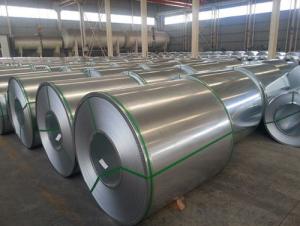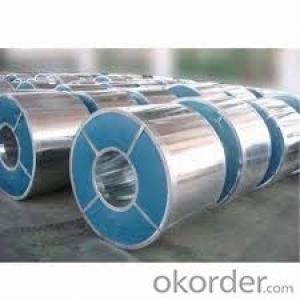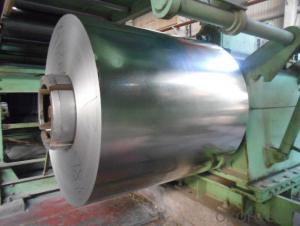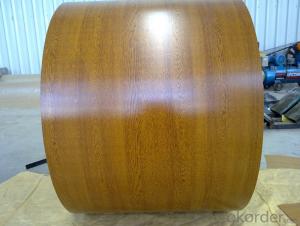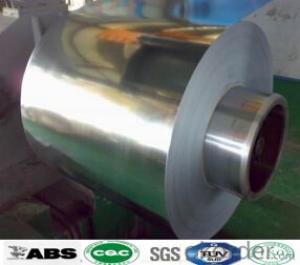Steel Coil Price 2015 New Products Hot Dipped Galvanized
- Loading Port:
- Shanghai
- Payment Terms:
- TT OR LC
- Min Order Qty:
- 50 m.t.
- Supply Capability:
- 60000 m.t./month
OKorder Service Pledge
OKorder Financial Service
You Might Also Like
| Place of Origin: | Hebei China (Mainland) | Brand Name: | CNBM | Model Number: | pre-painted galvanized steel coil |
| Type: | Steel Coil | Technique: | Hot Rolled | Surface Treatment: | Galvanized |
| Application: | Container Plate | Special Use: | High-strength Steel Plate | Width: | from 914mm to 1250mm |
| Length: | 1000-2000m | Certification:: | ISO9000 |
Packaging & Delivery
| Packaging Detail: | seaworthy packing or as your requirement |
| Delivery Detail: | 20-45 days after receive down payment. |
Specifications
1.Thickness: 0.15mm-1.5mm
2.Width:914mm-1250mm
3. z40-z275g/m2
4. color: all Ral
CNBM INTERNATIONAL
CNBM International Corporation (CNBM International) is the most important trading platform of
CNBM Group Corporation, a state-owned company under the direct supervision of State-owned Assets
Supervision and Administration Commission of the State Council.
As of the end of 2012, CNBM’s total assets exceeded RMB 300 billion, with more than 150,000
employees, and 20 companies under direct management with 100% share control or majority control,
among which 6 were listed companies, including 2 overseas listed. CNBM ranked NO.319 in the Top
Fortune World 500 of 2013 with 34.46 billion dollars revenue.
For now, we have established strategic partnerships with hundreds of domestic manufacturers and
extensive business relations with clients from over 120 countries in the fields of building materials and
equipments by making full use of its absolute superiority in both abundant source and solid technology
support. Currently, we have wholly-owned overseas subsidiaries and branches in 5 countries with a view
to realize localization, which also represents an essential progress in our globalization target.
STEEL SHEET/COIL DEPARTMENT
Our department is specialized in manufacturing and exporting the following products.
HOT ROLLED STEEL
COLD ROLLED STEEL
HOT-DIP GALVANIZED/ALUZINC STEEL
PRE-PAINTED GALVANIZED/ALUZINC STEEL
PRINTING STEEL
We can ensure that stable quality standards are maintained, strictly meeting both market
requirements and customers’ expectations. Our products enjoy an excellent reputation and have been
exported to Europe, South-America, the Middle-East, Southeast-Asia, Africa and Russia etc.. We sincerely
hope to establish good and long-term business relationship with your esteemed company.
COMPANY
PROFILE
- 1 -
- 2 -
Steel Coil/Sheet
CNBM UAE
CNBM INDIA
CNBM GERMANY
CNBM BRAZIL
CNBM K.S.A
CNBM INDONESIA
CNBM THAILAND
CNBM SOUTH AFRICA
- Q: What are the different types of steel coils available?
- There exists a variety of steel coils, each possessing distinct characteristics and uses. 1. Hot Rolled Steel Coils: These coils undergo production at high temperatures and are ideal for applications requiring a sleek and polished finish, such as automotive components, construction materials, and machinery. 2. Cold Rolled Steel Coils: In order to enhance surface finish and dimensional accuracy, these coils are processed at lower temperatures. They find extensive use in industries like automotive, appliances, and electronics, where precision is of utmost importance. 3. Galvanized Steel Coils: A layer of zinc is applied to these coils to safeguard the underlying steel against corrosion. They are commonly utilized in the construction sector, roofing, and automotive parts that are exposed to harsh environmental conditions. 4. Stainless Steel Coils: Created by combining iron, chromium, and other elements, these coils offer exceptional resistance to corrosion and possess high strength. They are widely employed in applications demanding hygiene, such as food processing equipment, medical instruments, and kitchen appliances. 5. Electrical Steel Coils: Specifically designed for applications requiring magnetic properties, these coils are utilized in transformers, electric motors, and generators. They exhibit low core losses and high permeability, ensuring efficient transfer of electrical energy. 6. Pre-painted Steel Coils: These coils are coated with paint or other protective coatings to enhance their visual appeal and provide additional protection against corrosion. They are commonly used in the construction industry for cladding, roofing, and siding. 7. Tinplate Steel Coils: A thin layer of tin is applied to these coils to prevent corrosion and act as a barrier against moisture and oxygen. They find widespread usage in the packaging industry for cans, containers, and other food or beverage packaging. These examples merely scratch the surface of the various steel coil options available in the market. Each variant possesses its own unique properties and applications, rendering them suitable for diverse industries and purposes.
- Q: What is the tensile strength of steel coils?
- The tensile strength of steel coils can vary depending on the grade and composition of the steel, but it is generally high, ranging from 400 to 700 megapascals (MPa).
- Q: How do you calculate the weight of a steel coil?
- To calculate the weight of a steel coil, you need to know the dimensions of the coil, specifically its length, width, and thickness. Then, you can use the density of steel (usually around 7850 kg/m³) and the formula: weight = length x width x thickness x density.
- Q: I want to anodize steel using heat. some steel turns gray instead of coloring when I heat it up using a torch.
- Steel doesn't anodize in the sense that aluminum and some other metals do. However, it can be heat-colored. The trick is to clean the surface first (it must be oxide free), then heat gently until the colors appear. These are called temper colors in steel. They are due to a thin adherent layer of oxide that forms and thickens as temperature is increased. They are quite temperature dependent. As the steel is heated, the first color to appear is pale yellow. This will progress through darker yellows, browns, purples, and blues as the temperature rises. Above blue, the oxide becomes the gray/black color you are apparently getting - this is the result of heating too fast and too hot. See the chart at the site below for colors in plain carbon steel. Note that the temperatures are pretty low - It all starts around 400 F and if you go above 600 F the show's all over.
- Q: What are the typical coil width options?
- The typical coil width options vary depending on the industry and application, but common options include 12 inches, 18 inches, 24 inches, and 36 inches.
- Q: Maybe it is obvious. But i have thought alot about it.I thought steel at a cool temperature was unbreakable. I am not one for science or physics or engineering (i am a political science major). But i don't understand why the planes that struck the world trade center on 9-11 didn't just dent the side and fall,How did the place break the steel? Was it the velocity? Is steel easily broken?I realized that i wasn't taught how the planes broke the steel, and that no one ever asked. I searched the web and i couldn't find the answer or even anyone who had asked the question before.(i don't care about conspiracy theories, i just want scientific facts)
- I saw a one-hour program about this on PBS a couple of years ago. The buildings were constructed with the concrete-clad steel supporting columns at the center of the buildings, with a relatively thin lattice of steel struts along the outer wall. When the planes hit, they sheered through the thin steel struts easily by sheer momentum, while, at the same time, the thin steel stripped off the wings. The bodies of the planes got as far as the supporting columns in the center of the buildings, but were stopped there. The heaviest, densest pieces, the engines, went completely through the buildings and popped out the other side. It's important to understand that even light materials can cut through metal, if the light material is going fast enough. I saw this first hand, when I was in the Navy and stationed on board ship. We had a helicopter crash on our flight deck during heavy weather. The blades were made of light, carbon-composite material, but they were going so fast that they cut through the aluminum deck. I still have photos of that damage.
- Q: During fatigue testing of any material (especially for steels), why is strain-control mode preferred over stress control mode?
- because metals, like steel, are ductile and will stretch before breaking. Straining the metal is stretching it, stressing the metal is applying a shearing force or bending until there is an actual metal failure. A sheet metal strap 1inch across and 24 gauge metal is commonly used to support metal ducting systems in construction. These have an average strain to failure weight load as high as 16,200 lbs. As reported by the smacna index, they will safely hold 6800 pounds. Of more interest is the screws used to hold the strap to the duct. While they are grade 3, fairly strong, they strain to 1400 pounds when properly installed, and are safely able to support 650 pounds, unless they are overtorqued (stripped) and this quickly drops to 400 pounds and 125 pounds...big difference.
- Q: y does 1095 steel on a katana weight about a pound less for the same amount than 1045? the 1095 is better right? but then why is 1045 steel more comenly used for practical use than 1095, even though i no its cheaper to use 1045 for tami mats. so is 1095 steel the better investment for buying and minor tami mat use?
- 1045 is a medium carbon steel is used when greater strength and hardness is desired than in the as rolled condition. Extreme size accuracy, straightness and concentricity combine to minimize wear in high speed applications. 1095 is a high carbon steel, but does not hold as sharp an edge. 1095 high carbon steel is harder and more durable than 440C stainless steel, but will rust much more easily. Stainless steel is more brittle than both 5160 and 1095 carbon steel, but is still very useful due to its resistance to rust and corrosion.
- Q: What are the common defects in steel coil finishes?
- Steel coil finishes can be affected by various defects that can impact both their appearance and functionality. Before using or selling the coil, these defects may need to be addressed. One common defect is coil breaks, where the steel strip breaks during winding or unwinding. If not dealt with, this defect can cause a discontinuity in the coil's surface and potentially lead to further damage. Another defect is edge wave, which refers to a distortion or waviness at the edges of the coil. This can occur during the rolling or cooling process and can affect the coil's flatness and uniformity. Corrosion is another issue that can arise if steel coils are not properly protected or stored. This can result in rust and degradation of the steel, impacting its strength and appearance. Streaks and stains can appear on the surface of steel coils due to improper cleaning or contamination during production. These defects can affect the aesthetic appearance of the steel and may need to be addressed before use. Scratches and dents can occur during handling, transportation, or storage of steel coils. These defects can impact the flatness and surface quality of the steel and may require repairs or adjustments. If a coating or paint is applied to the steel coil, several defects can arise, including blistering, peeling, or uneven application. These coating defects can affect the durability and appearance of the steel. It's important to note that the severity of these defects can vary, and different methods of repair or mitigation may be needed. Regular inspections and quality control measures can help to identify and address these defects before they become more significant issues.
- Q: How are steel coils used in the manufacturing of railway equipment?
- The strength, durability, and versatility of steel coils are crucial factors in their importance in the manufacturing of railway equipment. These coils, typically made from high-quality steel, are extensively used in various applications throughout the railway industry. A primary application of steel coils in the manufacturing of railway equipment is the production of train tracks. By rolling and shaping steel coils into long, continuous rails, the foundation of railway tracks is formed. This allows the tracks to withstand heavy loads, constant train traffic, and harsh weather conditions, thanks to the coils' strength and durability. Moreover, the uniformity and consistency of steel coils ensure smooth and safe train operations. Additionally, steel coils are utilized in the manufacturing of railway wagons and carriages. These coils are shaped into various components, such as the framework, body panels, and structural supports of the wagons. The robustness of steel coils guarantees the structural integrity of the wagons, enabling them to carry heavy cargo and endure the hardships of railway transportation. Furthermore, steel coils find use in the fabrication of various railway equipment accessories, including couplings, brake systems, and suspension components. These coils are shaped and sized precisely to meet the specific requirements of each accessory. The strength and resilience of steel coils make them ideal for these critical parts, ensuring the efficient and safe operation of railway equipment. In conclusion, the role of steel coils in the manufacturing of railway equipment is vital. Their strength, durability, and versatility make them an essential material for constructing train tracks, wagons, carriages, and various accessories. The use of steel coils guarantees the safety, reliability, and longevity of railway equipment, making them an integral part of the railway industry.
Send your message to us
Steel Coil Price 2015 New Products Hot Dipped Galvanized
- Loading Port:
- Shanghai
- Payment Terms:
- TT OR LC
- Min Order Qty:
- 50 m.t.
- Supply Capability:
- 60000 m.t./month
OKorder Service Pledge
OKorder Financial Service
Similar products
Hot products
Hot Searches
Related keywords
